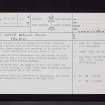Pricing Change
New pricing for orders of material from this site will come into place shortly. Charges for supply of digital images, digitisation on demand, prints and licensing will be altered.
Upcoming Maintenance
Please be advised that this website will undergo scheduled maintenance on the following dates:
Thursday, 9 January: 11:00 AM - 3:00 PM
Thursday, 23 January: 11:00 AM - 3:00 PM
Thursday, 30 January: 11:00 AM - 3:00 PM
During these times, some functionality such as image purchasing may be temporarily unavailable. We apologise for any inconvenience this may cause.
North Berwick Priory, Tile Kiln
Tile Kiln (13th Century)
Site Name North Berwick Priory, Tile Kiln
Classification Tile Kiln (13th Century)
Canmore ID 56762
Site Number NT58SW 3.02
NGR NT 5465 8504
Datum OSGB36 - NGR
Permalink http://canmore.org.uk/site/56762
- Council East Lothian
- Parish North Berwick
- Former Region Lothian
- Former District East Lothian
- Former County East Lothian
NT58SW 3.02 5465 8504.
A 13th century kiln for making floor tiles, situated 30 yds N of the line of the N wall of the Priory, and on slightly lower ground, was excavated by Richardson in 1908.
Specimens of tiles associated with the Priory and this kiln are in the National Museum of Antiquities of Scotland [NMAS], Royal Scottish Museum, British Museum, and North Berwick Museum. Ferrier notes that the remains of four tile kilns are shown in an etching of 1789; these were probably situated on the low ground SE of the priory.
J S Richardson 1929; RCAHMS 1924; W M Ferrier 1980
The site of the kiln excavated by Richardson, now filled in and overgrown, is located at NT 5465 8504.
Visited by OS (JP) 8 July 1975
Archaeological Evaluation (7 February 2011 - 11 February 2011)
NT 5465 8504 Three hand dug trenches were opened, 7–11 February 2011, on the site of the medieval tile kiln. Upstanding remains of the back wall of the kiln were located in trench 2 at 0.76m below modern ground level, a flagstone surface and wall foundation were located in Trench 1 at 1.26m below modern ground level and a further tile and stone-built structure were located in Trench 3 at a depth of 0.40m. The tiles from all three trenches tended to be roof rather than floor tile with a mixture of nibs and peg holes. Twenty samples were submitted for chemical analysis (ICP). The excavated structures were marked with tape and the trenches backfilled.
Two samples of pig bone were submitted for C14 dating from deposits contemporary with the kiln’s operation and demise. A date of 900 +/- 30 BP (calibrated to AD 1030 1220 at 95.4 % probability) associated with the kiln’s operation and a date of 870 +/- 30 BP (calibrated to 77.8% probability) associated with the kiln’s demise were received.
Archive: RCAHMS
Funder: Historic Scotland
Derek Hall 2011








